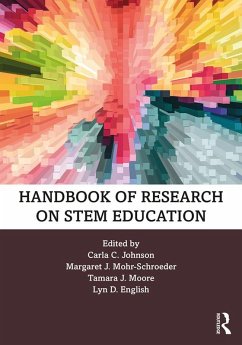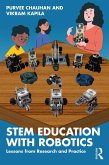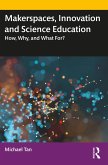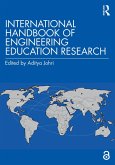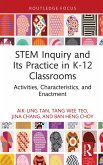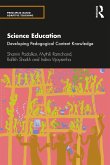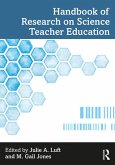Handbook of Research on STEM Education (eBook, ePUB)
Redaktion: Johnson, Carla C.; English, Lyn D.; Moore, Tamara J.; Mohr-Schroeder, Margaret J.
104,95 €
104,95 €
inkl. MwSt.
Sofort per Download lieferbar

52 °P sammeln
104,95 €
Als Download kaufen

104,95 €
inkl. MwSt.
Sofort per Download lieferbar

52 °P sammeln
Jetzt verschenken
Alle Infos zum eBook verschenken
104,95 €
inkl. MwSt.
Sofort per Download lieferbar
Alle Infos zum eBook verschenken

52 °P sammeln
Handbook of Research on STEM Education (eBook, ePUB)
Redaktion: Johnson, Carla C.; English, Lyn D.; Moore, Tamara J.; Mohr-Schroeder, Margaret J.
- Format: ePub
- Merkliste
- Auf die Merkliste
- Bewerten Bewerten
- Teilen
- Produkt teilen
- Produkterinnerung
- Produkterinnerung

Bitte loggen Sie sich zunächst in Ihr Kundenkonto ein oder registrieren Sie sich bei
bücher.de, um das eBook-Abo tolino select nutzen zu können.
Hier können Sie sich einloggen
Hier können Sie sich einloggen
Sie sind bereits eingeloggt. Klicken Sie auf 2. tolino select Abo, um fortzufahren.

Bitte loggen Sie sich zunächst in Ihr Kundenkonto ein oder registrieren Sie sich bei bücher.de, um das eBook-Abo tolino select nutzen zu können.
The first Handbook of Research on STEM Education , this volume draws on a rich and growing research base and constitutes the first comprehensive synthesis of the field. Organized into six sections, the handbook addresses the cutting-edge and fast-growing interdisciplinary nature of STEM education.
- Geräte: eReader
- ohne Kopierschutz
- eBook Hilfe
- Größe: 4.85MB
Andere Kunden interessierten sich auch für
![Amplifying Informal Science Learning (eBook, ePUB) Amplifying Informal Science Learning (eBook, ePUB)]() Amplifying Informal Science Learning (eBook, ePUB)41,95 €
Amplifying Informal Science Learning (eBook, ePUB)41,95 €![STEM Education with Robotics (eBook, ePUB) STEM Education with Robotics (eBook, ePUB)]() Purvee ChauhanSTEM Education with Robotics (eBook, ePUB)43,95 €
Purvee ChauhanSTEM Education with Robotics (eBook, ePUB)43,95 €![Makerspaces, Innovation and Science Education (eBook, ePUB) Makerspaces, Innovation and Science Education (eBook, ePUB)]() Michael TanMakerspaces, Innovation and Science Education (eBook, ePUB)37,95 €
Michael TanMakerspaces, Innovation and Science Education (eBook, ePUB)37,95 €![International Handbook of Engineering Education Research (eBook, ePUB) International Handbook of Engineering Education Research (eBook, ePUB)]() International Handbook of Engineering Education Research (eBook, ePUB)0,00 €
International Handbook of Engineering Education Research (eBook, ePUB)0,00 €![STEM Inquiry and Its Practice in K-12 Classrooms (eBook, ePUB) STEM Inquiry and Its Practice in K-12 Classrooms (eBook, ePUB)]() Aik-Ling TanSTEM Inquiry and Its Practice in K-12 Classrooms (eBook, ePUB)20,95 €
Aik-Ling TanSTEM Inquiry and Its Practice in K-12 Classrooms (eBook, ePUB)20,95 €![Science Education (eBook, ePUB) Science Education (eBook, ePUB)]() Shamin PadalkarScience Education (eBook, ePUB)38,95 €
Shamin PadalkarScience Education (eBook, ePUB)38,95 €![Handbook of Research on Science Teacher Education (eBook, ePUB) Handbook of Research on Science Teacher Education (eBook, ePUB)]() Handbook of Research on Science Teacher Education (eBook, ePUB)104,95 €
Handbook of Research on Science Teacher Education (eBook, ePUB)104,95 €-
-
-
The first Handbook of Research on STEM Education, this volume draws on a rich and growing research base and constitutes the first comprehensive synthesis of the field. Organized into six sections, the handbook addresses the cutting-edge and fast-growing interdisciplinary nature of STEM education.
Dieser Download kann aus rechtlichen Gründen nur mit Rechnungsadresse in A, B, BG, CY, CZ, D, DK, EW, E, FIN, F, GR, HR, H, IRL, I, LT, L, LR, M, NL, PL, P, R, S, SLO, SK ausgeliefert werden.
Produktdetails
- Produktdetails
- Verlag: Taylor & Francis eBooks
- Seitenzahl: 526
- Erscheinungstermin: 27. April 2020
- Englisch
- ISBN-13: 9780429664649
- Artikelnr.: 59327865
- Verlag: Taylor & Francis eBooks
- Seitenzahl: 526
- Erscheinungstermin: 27. April 2020
- Englisch
- ISBN-13: 9780429664649
- Artikelnr.: 59327865
- Herstellerkennzeichnung Die Herstellerinformationen sind derzeit nicht verfügbar.
Carla C. Johnson is Professor of Science Education and Associate Dean in the College of Education, and Executive Director of the Friday Institute for Educational Innovation at North Carolina State University, USA. Margaret J. Mohr-Schroeder is Professor of STEM Education and Associate Dean at University of Kentucky, USA. Tamara J. Moore is Professor of Engineering Education and Interim Executive Director of INSPIRE Research at Purdue University, USA. Lyn D. English is Professor of STEM Education at Queensland University of Technology, Australia.
Contents
Preface
Section 1: The Nature of STEM
Chapter 1 - STEM Integration: A Synthesis of Conceptual Frameworks and Definitions
Chapter 2 - STEM Education Through the Epistemological Lens: Unveiling the Challenge of STEM Transdisciplinarity
Chapter 3 - Moving Toward an Equity-based Approach for STEM Literacy
Chapter 4 - A Worldly Perspective: Applying Theory to STEM Education
Chapter 5 - Theoretical Frameworks for STEM Education Research
Chapter 6 - Integrated STEM Pedagogies and Student Learning
Chapter 7 - Design Learning in STEM Education
Chapter 8 - The Importance of Early STEM Education
Chapter 9 - Elementary STEM Learning
Chapter 10 - Secondary STEM Learning
Chapter 11 - Considering STEM for Learners with Disabilities and Other Diverse Needs
Chapter 12 - Informal STEM Program Learning
Chapter 13 - Creating STEM Learning Opportunities through Partnerships
Chapter 14 - History of Integrated STEM Curriculum
Chapter 15 - Infusing Evidence-Based Reasoning in Integrated STEM
Chapter 16 - Integrating Computational Thinking in STEM
Chapter 17 - Socio-Scientific Issues as Contexts for the Development of STEM Literacy
Chapter 18 - Learning Models and Modeling Across the STEM Disciplines
Chapter 19 - Contemporary Methods of Assessing Integrated STEM Competencies
Chapter 20 - Intersectionality in STEM Education Research
Chapter 21 - Perspectives of Identity as an Analytic Framework in STEM Education
Chapter 22 - Race-related Factors in STEM: A Review of Research on Educational Experiences and Outcomes for Racial and Ethnic Minorities
Chapter 23 - Research on Gender Equity in STEM Education
Chapter 24 - The Affordances and Challenges of Enacting Culturally Relevant STEM Pedagogy
Chapter 25 - STEM Inclusion Research for English Language Learners (ELLs): Making STEM Accessible to All
Chapter 26 - Parent Involvement and its Influence on Children's STEM Learning: A Review of the Research
Chapter 27 - Elementary STEM Teacher Education: Recent Practices to Prepare General Elementary Teachers for STEM
Chapter 28 - Secondary STEM Teacher Education
Chapter 29 - Research on K-12 STEM Professional Development Programs: An Examination of Program Design and Teacher Knowledge and Practice
Chapter 30 - Teacher Leadership for STEM Programming
Chapter 31 - STEM-Focused School Models
Chapter 32 - STEM Policy in the United States and Canada
Chapter 33 - STEM Policy in Asia
Chapter 34 - STEM Policy in Australia
Chapter 35 - Latin American STEM Policy: A Review of Recent Initiatives on STEM Education in Four Latin American Countries
Chapter 36 - Measuring the Impact of Business Engagement on STEM Education
Chapter 37 - STEM Teacher Leadership in Policy
Preface
Section 1: The Nature of STEM
Chapter 1 - STEM Integration: A Synthesis of Conceptual Frameworks and Definitions
Chapter 2 - STEM Education Through the Epistemological Lens: Unveiling the Challenge of STEM Transdisciplinarity
Chapter 3 - Moving Toward an Equity-based Approach for STEM Literacy
Chapter 4 - A Worldly Perspective: Applying Theory to STEM Education
Chapter 5 - Theoretical Frameworks for STEM Education Research
Chapter 6 - Integrated STEM Pedagogies and Student Learning
Chapter 7 - Design Learning in STEM Education
Chapter 8 - The Importance of Early STEM Education
Chapter 9 - Elementary STEM Learning
Chapter 10 - Secondary STEM Learning
Chapter 11 - Considering STEM for Learners with Disabilities and Other Diverse Needs
Chapter 12 - Informal STEM Program Learning
Chapter 13 - Creating STEM Learning Opportunities through Partnerships
Chapter 14 - History of Integrated STEM Curriculum
Chapter 15 - Infusing Evidence-Based Reasoning in Integrated STEM
Chapter 16 - Integrating Computational Thinking in STEM
Chapter 17 - Socio-Scientific Issues as Contexts for the Development of STEM Literacy
Chapter 18 - Learning Models and Modeling Across the STEM Disciplines
Chapter 19 - Contemporary Methods of Assessing Integrated STEM Competencies
Chapter 20 - Intersectionality in STEM Education Research
Chapter 21 - Perspectives of Identity as an Analytic Framework in STEM Education
Chapter 22 - Race-related Factors in STEM: A Review of Research on Educational Experiences and Outcomes for Racial and Ethnic Minorities
Chapter 23 - Research on Gender Equity in STEM Education
Chapter 24 - The Affordances and Challenges of Enacting Culturally Relevant STEM Pedagogy
Chapter 25 - STEM Inclusion Research for English Language Learners (ELLs): Making STEM Accessible to All
Chapter 26 - Parent Involvement and its Influence on Children's STEM Learning: A Review of the Research
Chapter 27 - Elementary STEM Teacher Education: Recent Practices to Prepare General Elementary Teachers for STEM
Chapter 28 - Secondary STEM Teacher Education
Chapter 29 - Research on K-12 STEM Professional Development Programs: An Examination of Program Design and Teacher Knowledge and Practice
Chapter 30 - Teacher Leadership for STEM Programming
Chapter 31 - STEM-Focused School Models
Chapter 32 - STEM Policy in the United States and Canada
Chapter 33 - STEM Policy in Asia
Chapter 34 - STEM Policy in Australia
Chapter 35 - Latin American STEM Policy: A Review of Recent Initiatives on STEM Education in Four Latin American Countries
Chapter 36 - Measuring the Impact of Business Engagement on STEM Education
Chapter 37 - STEM Teacher Leadership in Policy
Contents
Preface
Section 1: The Nature of STEM
Chapter 1 - STEM Integration: A Synthesis of Conceptual Frameworks and Definitions
Chapter 2 - STEM Education Through the Epistemological Lens: Unveiling the Challenge of STEM Transdisciplinarity
Chapter 3 - Moving Toward an Equity-based Approach for STEM Literacy
Chapter 4 - A Worldly Perspective: Applying Theory to STEM Education
Chapter 5 - Theoretical Frameworks for STEM Education Research
Chapter 6 - Integrated STEM Pedagogies and Student Learning
Chapter 7 - Design Learning in STEM Education
Chapter 8 - The Importance of Early STEM Education
Chapter 9 - Elementary STEM Learning
Chapter 10 - Secondary STEM Learning
Chapter 11 - Considering STEM for Learners with Disabilities and Other Diverse Needs
Chapter 12 - Informal STEM Program Learning
Chapter 13 - Creating STEM Learning Opportunities through Partnerships
Chapter 14 - History of Integrated STEM Curriculum
Chapter 15 - Infusing Evidence-Based Reasoning in Integrated STEM
Chapter 16 - Integrating Computational Thinking in STEM
Chapter 17 - Socio-Scientific Issues as Contexts for the Development of STEM Literacy
Chapter 18 - Learning Models and Modeling Across the STEM Disciplines
Chapter 19 - Contemporary Methods of Assessing Integrated STEM Competencies
Chapter 20 - Intersectionality in STEM Education Research
Chapter 21 - Perspectives of Identity as an Analytic Framework in STEM Education
Chapter 22 - Race-related Factors in STEM: A Review of Research on Educational Experiences and Outcomes for Racial and Ethnic Minorities
Chapter 23 - Research on Gender Equity in STEM Education
Chapter 24 - The Affordances and Challenges of Enacting Culturally Relevant STEM Pedagogy
Chapter 25 - STEM Inclusion Research for English Language Learners (ELLs): Making STEM Accessible to All
Chapter 26 - Parent Involvement and its Influence on Children's STEM Learning: A Review of the Research
Chapter 27 - Elementary STEM Teacher Education: Recent Practices to Prepare General Elementary Teachers for STEM
Chapter 28 - Secondary STEM Teacher Education
Chapter 29 - Research on K-12 STEM Professional Development Programs: An Examination of Program Design and Teacher Knowledge and Practice
Chapter 30 - Teacher Leadership for STEM Programming
Chapter 31 - STEM-Focused School Models
Chapter 32 - STEM Policy in the United States and Canada
Chapter 33 - STEM Policy in Asia
Chapter 34 - STEM Policy in Australia
Chapter 35 - Latin American STEM Policy: A Review of Recent Initiatives on STEM Education in Four Latin American Countries
Chapter 36 - Measuring the Impact of Business Engagement on STEM Education
Chapter 37 - STEM Teacher Leadership in Policy
Preface
Section 1: The Nature of STEM
Chapter 1 - STEM Integration: A Synthesis of Conceptual Frameworks and Definitions
Chapter 2 - STEM Education Through the Epistemological Lens: Unveiling the Challenge of STEM Transdisciplinarity
Chapter 3 - Moving Toward an Equity-based Approach for STEM Literacy
Chapter 4 - A Worldly Perspective: Applying Theory to STEM Education
Chapter 5 - Theoretical Frameworks for STEM Education Research
Chapter 6 - Integrated STEM Pedagogies and Student Learning
Chapter 7 - Design Learning in STEM Education
Chapter 8 - The Importance of Early STEM Education
Chapter 9 - Elementary STEM Learning
Chapter 10 - Secondary STEM Learning
Chapter 11 - Considering STEM for Learners with Disabilities and Other Diverse Needs
Chapter 12 - Informal STEM Program Learning
Chapter 13 - Creating STEM Learning Opportunities through Partnerships
Chapter 14 - History of Integrated STEM Curriculum
Chapter 15 - Infusing Evidence-Based Reasoning in Integrated STEM
Chapter 16 - Integrating Computational Thinking in STEM
Chapter 17 - Socio-Scientific Issues as Contexts for the Development of STEM Literacy
Chapter 18 - Learning Models and Modeling Across the STEM Disciplines
Chapter 19 - Contemporary Methods of Assessing Integrated STEM Competencies
Chapter 20 - Intersectionality in STEM Education Research
Chapter 21 - Perspectives of Identity as an Analytic Framework in STEM Education
Chapter 22 - Race-related Factors in STEM: A Review of Research on Educational Experiences and Outcomes for Racial and Ethnic Minorities
Chapter 23 - Research on Gender Equity in STEM Education
Chapter 24 - The Affordances and Challenges of Enacting Culturally Relevant STEM Pedagogy
Chapter 25 - STEM Inclusion Research for English Language Learners (ELLs): Making STEM Accessible to All
Chapter 26 - Parent Involvement and its Influence on Children's STEM Learning: A Review of the Research
Chapter 27 - Elementary STEM Teacher Education: Recent Practices to Prepare General Elementary Teachers for STEM
Chapter 28 - Secondary STEM Teacher Education
Chapter 29 - Research on K-12 STEM Professional Development Programs: An Examination of Program Design and Teacher Knowledge and Practice
Chapter 30 - Teacher Leadership for STEM Programming
Chapter 31 - STEM-Focused School Models
Chapter 32 - STEM Policy in the United States and Canada
Chapter 33 - STEM Policy in Asia
Chapter 34 - STEM Policy in Australia
Chapter 35 - Latin American STEM Policy: A Review of Recent Initiatives on STEM Education in Four Latin American Countries
Chapter 36 - Measuring the Impact of Business Engagement on STEM Education
Chapter 37 - STEM Teacher Leadership in Policy
